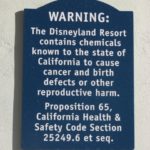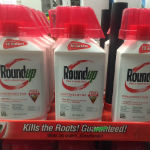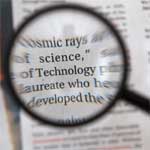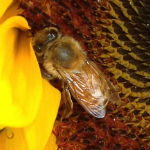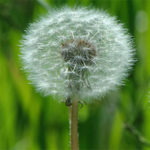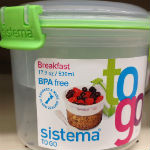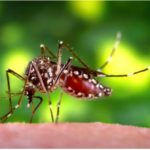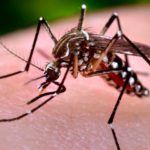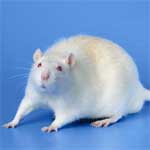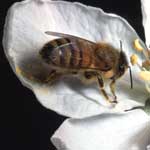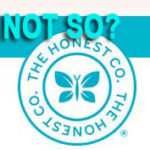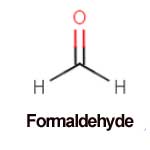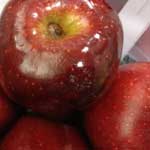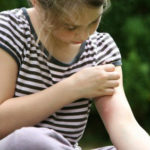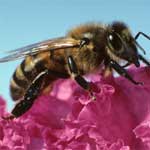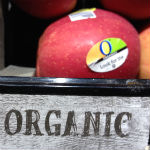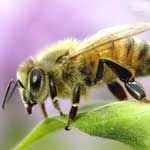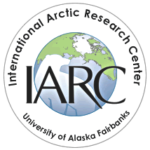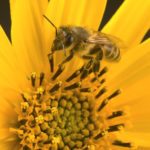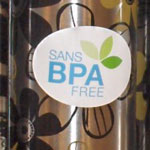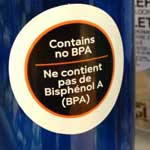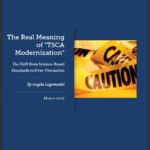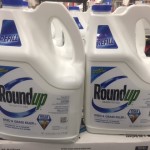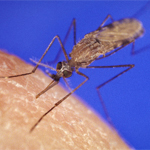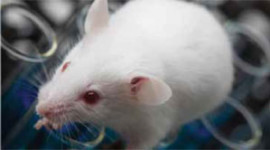"The Toxic Substances Control Act Amendments May Do Little to Relieve California Headaches for Businesses," By Morrison & Foerster LLP. Business groups largely supported the Toxic Substances Control Act (TSCA) Amendments―recently signed into law by President Obama—in order to address concerns about the emergence of varying state-by-state requirements that regulate the chemicals used in consumer products (see prior client alert). For businesses that wish to avail themselves of California’s … [Read more...]
Should Your Worry About PFOAs in Drinking Water?
"Teflon, Other Chemicals Receive Greater EPA Scrutiny," By Michael McGrady. The Environmental Protection Agency (EPA) has instituted new health advisories for chemicals used in the manufacture of Teflon cookware, plastics, and fabrics. EPA’s action came in response to the discovery of traces of perfluorooctanoic acid (PFOA) being found in groundwater sources in New Hampshire, New York, and Vermont. EPA’s May 19 guidelines reduce the acceptable level of perfluorooctane sulfonate (PFOS) and PFOA … [Read more...]
Teflon Decision More Emotional than Scientific
"DuPont Loses Bellwether C8 Teflon Case," By American Council on Science and Health. Professor David Freeman, Chair of Petroleum Engineering at Marietta College, has been awarded $5.1 million in a lawsuit against DuPont, which he blames for his testicular cancer. A jury of four women and three men in the U.S. District Court in Columbus agreed with him, and said the company acted with malice because it dumped water containing what it calls C8 (perfluorooctanoic acid, or PFOA) into the Ohio River … [Read more...]
Message to Harris Teeter: Ignore Alarmists
"Dear Harris Teeter Manager: Normal Moms Don’t Believe Chemicals Are Evil," By Julie Gunlock. Dear Harris Teeter Manager, I heard you got harassed the other day. I know this because last week I received an email from a group called Safer Chemicals, Healthy Families (SCHF). The group’s name might not be very creative, but they are effective at reaching moms with their overwrought claims that affordable food and everyday products are destroying the earth and threatening human health. The SCHF … [Read more...]
Glyphosate Politics
"Rounding Up the Cowards: EU Leaders Block Glyphosate," By Angela Logomasini. As reported in the Wall Street Journal this week, yet another valuable pesticide product may eventually be removed from the market place. But despite the Journal’s assertion that the controversy stems from uncertain science, the real source is politics. Too many European lawmakers are afraid to take a stand that might offend environmental activists, even though inaction will raise food prices and hinder … [Read more...]
Greens Would Starve Africa
"How to Starve Africa: Ask the European Green Party," By David Zaruk, the RiskMonger. There is a commonly shared neo-colonialist expression: The Europeans have the watches; the Africans have the time. Today, the European Green Party, with the support of countless environmentalist NGOs, proposed an initiative in the European Parliament to make Africa wait for at least another generation to be able to lift itself out of poverty. The report tabled by Green MEP, Maria Heubuch, is as vile as it is … [Read more...]
Prop65’s Absurd Warning Labels
"Should California Put a Warning Label on Your Penis?" By Josh Bloom. A few years ago, my mother gave me a Christmas present (nice Jewish family, right?). I had no idea what it was, and I was a bit puzzled by the package — a plain cardboard box with the following on the label: WARNING: This product contains chemicals known to the State of California to cause cancer and birth defects or other reproductive harm. This got me wondering why my mother would get me weapons-grade uranium as a gift. … [Read more...]
Dioxin Update
"Doomsday Chemical’ Update: Whatever Happened to Dioxin?" By Gordon Gribble. Dioxin, once proclaimed by the environmental community as the “doomsday chemical” of the 20th century and the “deadliest substance ever created by chemists,” has faded from the media spotlight. Why? Why did the EPA official who recommended the evacuation of Times Beach, Missouri, admit that he made a mistake and that the evacuation of this community following the spraying of dioxin-contaminated oil on roads, and a … [Read more...]
BPA’s Alleged Impact on Teeth
"Study on BPA and Hypermineralisation Makes us Almost Drop our Teeth," By BPA Coalition. Medical Research (INSERM) presented a study at the 18th European Congress of Endocrinology claiming that exposure to Bisphenol A (BPA) could weaken teeth development in children. More specifically they link BPA exposure to Molar Incisor Hypermineralisation (MIH); it affects 18% of young children between 6 and 9, as their permanent first molars and incisors are more sensitive and prone to cavities. While the … [Read more...]
TSCA Reform Paused
"One Enlightened Statesman: Sen. Rand Paul Pauses TSCA Bill," By Angela Logomasini, Ph.D. Three cheers to Senator Rand Paul for actually caring enough to read legislation before voting on its passage. Last week, he held up legislation that will vastly expand the Environmental Protection Agency’s power to regulate chemicals. As I pointed out recently, this legislation to amend the federal Toxic Substances Control Act (TSCA) has been moving along without proper consideration from most members of … [Read more...]
EWG Deception on Herbicide Risk
"EWG’s Latest Glyphosate Flop," By The Center for Accountability in Science. The Environmental Working Group (EWG) claims to fight for the public interest, yet rarely does so using solid science. A day after we laid out the facts on glyphosate, EWG was out in the media trying to keep people afraid of it. Claiming “a growing body of research” is linking the herbicide glyphosate (known by the brand name Round Up) to non-Hodgkin’s lymphoma, EWG failed to highlight that it really only found one … [Read more...]
Scientist Rebuke Pseudoscience on “Endocrine Disrupters”
"Well-known Scientists Ready to Stem the Onslaught of Pseudoscience in the EU," By PRNewswire. A meeting was held between Dr. Vytenis Andriukaitis, Commissioner of Health & Food Safety and well established and respected scientists (Prof. Sir Colin Berry, Prof. Alan Boobis, Prof. Wolfgang Dekant, Prof. Daniel Dietrich, Prof. Helmut Greim, Prof. Pat Heslop-Harrison and Prof. Richard Sharpe) in the fields of human risk assessment and endocrine active compounds ("endocrine disrupting chemicals" … [Read more...]
Non-Pesticide Related Honeybee Losses
"3 Non-Pesticide Reasons Beekeepers Lost 44 Percent Of Bees In 2015-16," By Hank Campbell. The Bee Informed Partnership takes an annual survey of commercial and backyard beekeepers in order to track health and survival rates of honey bee colonies. The latest results show that colonies declined 44 percent during the year spanning April 2015 to April 2016. That sounds alarming, and it is in contrast to studies showing that bee numbers are not in decline, they were instead at a 20-year high last … [Read more...]
EPA “Inadvertently” Admits: Glyphosate “Not Likely” a Carcinogen
"EPA (sort of) Admits: Glyphosate Not Likely Carcinogen," By The Center for Accountability in Science Team. A few days ago, the U.S. Environmental Protection Agency (EPA) published a report concluding glyphosate is unlikely carcinogenic to humans. The EPA pulled the report not long after, telling Reuters it was “because our assessment is not final”— it had been published “inadvertently.” Reuters noted, however, that the accompanying memo was labeled “Final.” The report is expected to be … [Read more...]
Plastics Alarmism
"Calling TIME Out on Plastic Alarmism," By The Center for Accountability in Science Team. There’s no shortage of news reports and websites with scary messages about chemicals, but two articles this week caught our attention. First, TIME magazine engaged in a bit of click-baiting this week with a health article warning about common plastics: “That Plastic Container You Microwave In Could Be Super-Toxic.” Next, an article at the Philadelphia Inquirer’s website, although written by two Ph.D.’s, … [Read more...]
A Smart Approach to Fight Zika
"We Don’t Need Billion$ To Prevent Zika," by Paul Driessen and Robert Novack. The Zika virus is increasingly linked to serious neurological complications for pregnant women and microcephaly in newborns: smaller than normal heads and brains. It also affects areas of fetal brains that control basic muscular, motor, speech and other functions, leading to severe debilities that require expensive care throughout a person’s life. The disease is becoming a crisis in Brazil, site of this year’s Summer … [Read more...]
Glyphosate Safety Report Disappears
"EPA Magically Makes Glyphosate Safety Report Disappear," Julianna LeMieux. Glyphosate does not cause cancer … if you read about it over the weekend. That was the conclusion of a report published online by the Environmental Protection Agency on Friday, April 29, 2016, finally shutting down a 30-year debate by giving a definitive answer to a hotly contested topic. But, by Monday, May 2, it was gone. The report, “Evaluation of the Carcinogenic Potential of Glyphosate,” was published by the Cancer … [Read more...]
Pesticides and Autism
"3 Reasons Aerial Pesticides Are Not Causing Autism," By Hank Campbell. Steven Hicks, M.D. PhD, pediatrician at Penn State Milton S. Hershey Medical Center, in Hershey, Pennsylvania, looked at autism rates in a swampy region of New York and saw higher developmental delay and autism diagnoses in some areas where and thinks he knows why; pyrethroid pesticides being sprayed by airplanes to kill mosquitoes. Scientists, toxicologists, and public health officials certainly appreciate some attention … [Read more...]
UK Citizens Sour About “Natural Herbicide”
"Britiots Using Salad Dressing to Kill Weeds," By Josh Bloom. True or false: It is a good idea to use a more dangerous chemical to replace a safer one? Before you answer, take a look at a couple of videos that the folks in Bristol in the UK should have watched before they decided to “go organic” and substitute vinegar (acetic acid plus water) for glyphosate — a supernaturally safe herbicide, which has been used for more than 40 years in the United States. The first shows what happens when you … [Read more...]
On Bacon and Cancer
"Does Eating Bacon Really Cause Cancer?" By The Center for Accountability in Science. Bacon lovers in California can breathe a sigh of relief—for now, at least. The state Office of Environmental Health Hazard Assessment, which manages Proposition 65 warning labels, has announced it will not require warnings on bacon or other processed meats following news last fall that the World Health Organization’s International Agency for Research on Cancer had classified these meats as carcinogenic. When … [Read more...]
TSCA Consensus May Prove Toxic
"TSCA 'Reform': Consensus May Again Prove Toxic," By Angela Logomasini. According to a story in Bloomberg BNA, a final vote on legislation to reform the nation’s chemical law—the Toxic Substances Control Act—may be imminent. The story quotes Senator James Inhofe (R-Okla.), who explained at a congressional hearing the other day, “It looks like now we’re [the U.S. Senate Environment and Public Works Committee] just a matter of hopefully hours away of having an agreement with the House.” The … [Read more...]
Questions about Microbead Policies
"Are Microbeads Really Bad?" Julie Gunlock. Environmentalists have long been on a tear about microbeads and their campaign to ban them has been successful. Not only has President Obama banned the beads (starting in 2017), Congress is doubling up, introducing their own microbead ban which would also ban use of the plastic abrasives by 2017. Activists that promoted the restrictions on microbeads often say that banning microbeads will clean up the waterways and help marine life. Will it? It’s … [Read more...]
Scaremongering and Nonsense on Glyphosate
"Breaking Down Bullshit: How Clever Activists Make You Afraid!," By The Risk-Monger. In my last blog I stated how the organic industry lobby openly lies, spreads fear and attacks its competition – all activities that any organisation or company with an ethical code of conduct would forbid. I’d like to demonstrate how one organic lobbying organisation, USRTK, desperately needs such a code (… and a lot of integrity). As I have had quite a few personal attacks this week from people who take … [Read more...]
Fast Food and Phthalates
"Do People Who Eat Fast Food Have Higher Levels of Phthalates?" By Center for Accountability in Science. You may have seen the headlines, “If You’re Eating Fast Food, You’re Probably Also Eating Phthalates.” A new study published today in Environmental Health Perspectives finds that teens and adults who reported eating more “fast food” had slightly higher levels of two types of phthalates in a urine test. But before you start to worry about the safety of your burrito or burger, let’s break down … [Read more...]
Another Flawed BPA Rat Study
"A Study is Rotten in the State of Denmark, and Here’s Why," by Josh Bloom. We need another BPA study like we need root canal. For many years, hundreds (thousands?) of them have been published just about everywhere except on bus shelters, desperately hoping to find something wrong with the chemical, which is used to make a variety of plastic products, such as can liners. The studies are are mostly terrible. But that hasn’t stopped a Danish group from publishing a laughably-flawed paper on the … [Read more...]
Devil in the Details of TSCA Modernization
"The Devil, the Details, and 'Consensus' for 'TSCA Modernization,' Angela Logomasini. For some reason, there’s always near “consensus” when Congress passes environmental laws that later become controversial (for data, see my study from 2008 on this topic). There are probably two key reasons for this. First, no member wants to appear “anti-environmental” by voting against “green” legislation; and second, few members are paying much attention to the details. And that’s what appears to be … [Read more...]
Organic Fertilizer Killing Bees?
"Organic Fertilizer Is Great at Killing Bees," by Ruth Kava. A given of the organic agriculture movement is that organic growers don’t use synthetic pesticides and fertilizers, like organophosphates and glyphosate (RoundUp). All that fear-mongering about pesticides is only possible because environmental groups only test for the synthetic kind, they don’t test for the pesticides and fertilizers used by organic growers. Because those are safer? Absolutely not. In the Journal of Economic … [Read more...]
NRDC Lies
"NRDC Scientists Are Lying in the Weeds," by Josh Bloom There has been a long-running scare campaign against the commonly-used herbicide 2,4-D, which has been conducted by a number of environmental groups, the Natural Resources Defense Council being at or near the front of the pack. NRDC uses the time-tested strategy of equating 2,4-D with Agent Orange — the notorious herbicide that was used to defoliate swaths of Vietnam during the war. The name Agent Orange itself sounds scary, and the … [Read more...]
A Word from a Toxicologist
"A Word from a Toxicologist who Defected from the Federal Junk Science Army," By John Dale Dunn. Last week, I discovered Frank Schnell when he wrote a comment on formaldehyde and said it was not a cancer-causing agent and that the EPA had lied about it. His comment was on an American Council on Science and Health posting by Josh Bloom, Ph.D. (organic chemistry), with a 20-year history of pharmaceutical research. Bloom busied himself in the post eviscerating a scare-monger on formaldehyde from … [Read more...]
Still No Beepocalypse
"Near 20-Year High: Bee-pocalypse Postponed Again," By News Staff at Science 2.0. Despite the hype, there’s still no bee-pocalypse. Two weeks ago, the U.S. Department Agriculture released its latest count of commercial honeybee hives, and although the figure dipped 2.9 percent from the 20-year record-high set in 2014, the overall count of 2.7 million hives in 2015 remains strong. You wouldn’t know it from the news coverage. One Michigan television station recently led with the headline: … [Read more...]
BPA Science
"If It’s Science vs. Motherhood, Can Science Ever Win?" By Ben Miyares. In a bit of unfinished business, California’s Office of Environmental Health Hazard Assessment (OEHHA) added bisphenol A (BPA) to its Proposition 65 list of chemicals “known to the state to cause reproductive toxicity” last year. It now proposes to amend the rule. I say “unfinished business” because listing of the chemical requires businesses that expose individuals to more than a California-determined level of the chemical … [Read more...]
Reality Check for the Chemical Industry
"Trust in Government: A Bad Strategy for the Chemical Industry," by Angela Logomasini, Ph.D. There is a reason why people laugh when you say: “Trust me, I come from the government.” Governments are not particularly trustworthy because bureaucracies are not particularly efficient, and when they are efficient, there’s sometimes more reason to fear than trust. Yet for the past several years, the chemical industry has been trusting the idea that giving more power to feds will save them from a … [Read more...]
California Holds Back on Misleading BPA Warning Labels
"California Pulls Back on BPA Warnings – Quality of Information Trumps over Quantity," by BPA Coalition. Recently, there has been a lot of coverage on the other side of the Atlantic on the decision by the Californian Office of Environmental Health Hazard Assessment (OEHHA) to delay the implementation of “point-of-sale” warning label for products made out of BPA-based materials. The warning would have to be displayed where a customer pays for products in a shop. This decision exemplifies the … [Read more...]
BPA Use in Canned Food is Safe
"Before You Give Up Canned Food, Read This," by Center for Accountability in Science. It’s been a big week for BPA news. First, Campell’s announced it was phasing out the use of BPA in its canned foods. Then several environmental activist groups released a report finding that over 60 percent of canned foods still use BPA. But before you start throwing out your canned goods over health fears, let’s break down the research. There’s a reason BPA is used in canned foods. Read more. … [Read more...]
Alarmism, not Science, Guides Debate on Flame Retardants
"Outdated Science And Alarmism Drives Flame Retardant Debate," By Angela Logomasini. Learning from history should keep us from repeating our mistakes. Yet when it comes to environmental politics, the opposite seems to be true. History and improved scientific understanding fail to inform, while alarmism and irrational fears drive policy. The current debate related to flame retardant chemicals is a prime example. Environmental activist groups have petitioned the Consumer Product Safety … [Read more...]
Not So Green Products
"Shady Marketing Claims for "Green" Cleaning Products," by Richard Morrison. The Wall Street Journal reports today on the murky world of marketing for “green” and “natural” household products. Ads for these flower-scented and creatively-named brands often claim—or, at least, strongly imply—that they are safer and healthier that mainstream cleaning and deodorizing agents. Such claims are often made even when both products are chemically similar or borderline identical. Read more. … [Read more...]
Do We Need Government Flammability Standards for Furniture?
"Doing Away with Government Flammability Standards," By Angela Logomasini. During the past several years, there’s been much hype in the news alleging that flame retardant chemicals used on upholstered furniture pose unacceptable health risks. With these alarmist claims abounding, some green minded individuals complain that they unknowingly purchased couches that contain these chemicals because furniture manufacturers apply them to meet government flammability standards. To address this concern, … [Read more...]
EWG’s Annual Spring Deception
"Can We Just Enjoy Spring This Year? By SafeFruitsandVeggies.Com." The welcoming of spring brings many positives such as better weather, flowers and trees in bloom, an even bigger variety of fruits and veggies to enjoy and more daylight hours for outside activities. However, for those of us who work to provide credible food safety information to consumers, it also brings a predictable negative event that requires a corrective response – the annual release of the “dirty dozen” list by the … [Read more...]
Untrustworthy Government Science
"Government Scientists are Squandering the Public’s Trust," Center for Accountability in Science. Who do you trust to tell you whether the products you buy are safe? Bloggers like the Food Babe who crow about “yoga mat” chemicals in bread? Or federal environmental and health regulators who review scientific research and determine which products are safe for consumers? According to a recent ORC poll commissioned by the Center for Accountability in Science, respondents overwhelmingly placed the … [Read more...]
The Roundup on Life-Saving Weedkillers
"Glyphosate Saves Lives, Reduces Child Labor, and More," By Angela Logomasini. David Zaruk, aka the Risk Monger, has produced an excellent series of blog posts on why the herbicide glyphosate (the active ingredient in “Roundup”) is a wonderful thing, despite “cancer classifications” and demonization by greens. In a refreshingly blunt and honest series of posts, he makes some fantastic points that must shock green activists who can’t imagine why anyone would dare use a chemical to control … [Read more...]
(Dis)Honest Company: Scientifically Deceitful
"Why the Jessica Alba Detergent Fiasco Matters," by Josh Bloom. The juicy details of what I’ve named “Waterspot Gate” — the utter farce that could not have possibly made Jessica Alba’s The Honest Company look worse— mostly involve a series of intentional misstatements and outright lies about the company’s products. They only serve to throw more dirt into the grave that the company itself dug. Wall Street Journal reporter Serena Ng, whose thorough and tireless research peeled away one lie after … [Read more...]
Dirty Facts about Honest Company Detergents
"Waterspot Gate? Jessica Alba’s Detergent Claims are All(bs)," By Josh Bloom. Have we gotten so stupid that we are willing to believe the toxicological and environmental gibberish that we are now hearing from Jessica Alba? It would seem so, since the company created by the actress — who never went to college, yet has clearly earned an honorary B.P. degree (Bachelor’s of Prettiness) — managed to extract $1.7 billion from suckers who were convinced that substituting one harmless detergent for … [Read more...]
Children Liberated with Pesticides
"The Pre-Glyphosate Generation: I was a Child Labourer," By David Zaruk, The Riskmonger. Do you ever wonder why elementary schools close during July and August? Historically, children were needed to work in the farms then, in particular to pull weeds. Before herbicides were developed, this back-breaking job of hand weeding crops landed on the littlest limbs. Growing up on a mixed fruit and vegetable farm in Southern Ontario, I was one of those child labourers. In the 1960-70s, the Zaruks ran a … [Read more...]
Save the Monarchs: Keep Them off the ESA!
"Regulation Poses Biggest Threat to Monarch Butterflies," By Angela Logomasini. Like many nature lovers and gardeners, last year I launched a milkweed garden for monarch butterflies, starting from seed. After a long summer of manually picking pesky milkweed bugs and aphids off the plants, I noticed one monarch caterpillar. Success! I hope that caterpillar made it to the butterfly stage, and then took off to Mexico where many monarchs overwinter. My efforts represent a tiny part of a larger … [Read more...]
Don’t Worry About Pesticide Residues
"10,000 New Reasons Not To Worry About Pesticide Residues," by Steve Savage. Each year, the farmers around the world who produce our food (fruits, vegetables, grains) get the equivalent of a “grade” on a giant “group project.” For 2014 they got another A+ as they have for many years. The “test” entails thousands of food samples, which the USDA collects from normal US food channels and then scrutinizes for pesticide residues using extremely sensitive laboratory testing methods. Read more. … [Read more...]
Zika And Spurious Associations
"Organic Consumers Association Doubles Down On Pesticides And Zika Claims," by Hank Campbell. Organic Consumers Association, which funds Denier For Hire cabals like the anti-science group U.S. Right To Know, has baffled the science community once again by just making stuff up. When groups made claims that a larvicide named pyriproxyfen was part of a Monsanto conspiracy to promote Zika to give Monsanto a problem to solve(1), they were dismissed by even Washington Post reporters, so OCA has … [Read more...]
The “Science” of Carcinogens
"War On Science: Bogus Human Carcinogens," by Frank Schnell. In the last 15 years, EPA has invented three bogus human carcinogens: dioxin, formaldehyde, and TCE. Prior to the late 1990s, EPA’s cancer Risk Assessment Guidelines (CRAGs) required sufficient evidence of a cause-and-effect relationship in humans before a substance could be classified as a “known human carcinogen”. However, during the late 1990s, EPA modified its CRAGs to allow itself to classify substances as known human carcinogens … [Read more...]
Still Not So Honest Company
"Once Again, Tests Show Jessica Alba’s Honest Company isn’t so Honest," By Center for Accountability in Science. Jessica Alba has developed a personal care and cleaning product empire based on the premise that her products are “safer” that other brands on the market. But once again, testing reveals that one of her popular products contains ingredients she likes to claim could be harmful to consumers. This week, The Wall Street Journal reports that two independent lab tests of the Honest … [Read more...]
Controlling Zika
"DDT or DEET to Stop Zika? Not So Obvious," by Josh Bloom. The surest way to avoid worrying about getting the Zika virus is avoid being bitten by a mosquito transmitting it. That means sales of repellents are very likely to boom. Almost all products to keep mosquitoes away contain the active ingredient N,N-diethyl-meta-toluamide, commonly called DEET. Even the CDC recommends it. Read more. … [Read more...]
Neonics Not Harming Bees
"The Idea that Neonics Threaten Bees a Misguided Notion," By Peter Borst. The honey bee, whose problems we've heard so much about in recent years, forms a key partnership with farmers and agriculture. Yet, in a misguided effort to "save the bees," New York's Legislature is now considering measures that will drive a wedge between beekeepers and farmers, potentially damaging to both. More than four decades of professional experience in beekeeping and bee research has convinced me that the … [Read more...]
What Do Organic Labels Really Mean?
"When Food Labels Mislead, By Henry I. Miller and John J. Cohrssen. Organic farming has boomed in recent years, with total sales of organic products — food, bed linens, pillows and clothes — in the United States increasing 83 percent between 2007 and 2012. A primary driver of their success has been the USDA-regulated organic label, which implies to many consumers that these food products are somehow superior. But that is not what the label actually means. Nor is it true. Nor, arguably, is the … [Read more...]
Larvides Don’t Cause Microcephaly
"Zika and Monsanto: Did you Buy the Bogus Viral Story?" by Center for Accountability in Science. Understandably, lots of us are worried about the possible link between the Zika virus and a reported increase in cases of microcephaly, a birth defect in which a baby’s brain doesn’t fully develop in the womb. Now, a group of doctors in Argentina claims these birth defects aren’t actually caused by the mosquito-transmitted Zika virus. Instead, these doctors who call themselves “Physicians in … [Read more...]
Zika: Part of a Much Bigger Public Health Problem
"Zika Wake-Up Call," by Angela Logomasini. The spread of the mosquito-transmitted Zika virus should be yet another wake-up call for public officials around the world. As a relatively new threat, Zika has captured headlines in a world where many insect-transmitted diseases continue to wreak havoc on public health. Unfortunately, the ability to control all such vector-borne diseases is hindered by more than our limited scientific understanding. Disease control is limited by the lack of political … [Read more...]
EPA “Crisis” Science Racket
"How Natural Variations Became Environmental Crises: The Word Game," by Frank Schnell. In How Natural Variations Became Environmental Crises: The Numbers Racket, we looked at how officially “safe” levels of exposure gradually went from conservative, to ultra-conservative, to completely ridiculous. Even before the manipulation of numbers became commonplace, the manipulation of words was a major tool in promoting fear about science and keeping it alive. Simple words in common usage, like “risk”, … [Read more...]
Formaldehyde Cancer Claims Debunked
"Everything Causes Cancer – If You Listen to the NRDC," by Lila Abassi. I wish that when I was a student of anatomy I could have argued my way out of dissecting stinky cadavers – and I would have had a friend in Jennifer Sass, an alarmist who blogs for the Natural Resources Defense Council. She sounds off on a recent report published by the Centers for Disease Control and Prevention, which discusses health concerns regarding formaldehyde. Ms. Sass has a real issue with Lumber Liquidators, a … [Read more...]
Science Overruled on Causes of Cancer
"S. Korean Court Overrules Scientific Evidence On Cancer Causation. What’s Next?" By Gil Ross. A recent decision by a South Korean Administrative Court found that the ovarian cancer which killed a Samsung plant worker at the age of 36 bore a “significant causal relationship” to her long-term exposure to certain chemicals involved in the process of making silicon chips. The deceased worker, Lee Eun-joo, began her career at the Samsung factory in 1993 at the age of 17 and died in 2012. She had … [Read more...]
Prop65: Trial Lawyers’ Get Rich Scheme
"California Issues Another Gift to Trial Lawyers and Blow to Small Businesses," by Center for Accountability in Science. We’ve talked extensively on our blog about the problems with California’s chemical warning law known as Proposition 65. It requires warning labels on everything from coffee to sunglasses without offering consumers any context about the actual risk of chemical exposure. Instead of helping Californians make healthier choices, the law has been used as a tool for bounty hunters … [Read more...]
Zika Virus and Pesticides
"Zika Virus Will Sure Get Us to Embrace Toxic Chemicals," by Hank Campbell.The recurring joke in science when the Ebola craze consumed American media was that all the wealthy elites in California, Oregon and Washington who denied vaccines due to concerns about autism, would make sure their families were first in line for a new vaccine. While rich coastal parents knew they could avoid risk for their special snowflakes, while still protecting them from whooping cough (pertussis) by counting on … [Read more...]
Antifreeze in Food?
"Are You Anti-Antifreeze? Read This," by Josh Bloom. All antifreezes are not created equal. Actually, that should read “both antifreezes are not equal,” since there are only two that are commonly used (but that’s a terrible lead). Yet those two act alike, they sound alike, they even taste alike, but they could not be more different and in that difference is another way where environmental activists get so much wrong about chemicals. The difference is due to a single carbon atom, which makes one … [Read more...]
USDA Affirms Yet Again: Pesticide Residues “Pose No Safety Concern”
"Predictability Accompanies USDA Report Release," by SafeFruitsandVeggies.com. This month, USDA released the 2014 Pesticide Data Program results accompanied by the conclusion that residues “pose no safety concern.” This result was no surprise since year after year this program verifies the safety of organic and conventional fruits and veggies. But, this is also predictable: Media coverage of this “good news” story for consumers was almost non-existent with only produce trade publications and … [Read more...]
Toxic TSCA Reform?
"TSCA 'Reform': It’s Old (39 years), But It Works! Why revise? By Gil Ross. Wending its way toward seemingly-inevitable final passage, a darling of the chemophobic left, “TSCA Revision,” will do no good for Americans, further empower the hyper-regulatory EPA, and be hugely expensive. The good old Toxic Substances Control Act was working fine. After years and years of debate spurred by the enviro-left, the Toxic Substances Control Act (affectionately, TSCA) of 1976 is on the verge of “reform.” … [Read more...]
Dismiss Christmas Toy Alarmism
"Holiday Toy Safety: Common Sense Trumps Activist Advice," By Angela Logomasini. If you believe the U.S. Public Interest Group (USPIRG), the “Slinky Jr.” or “Fun Bubbles Jump Rope” that Santa might bring to your children should send shivers down your spine. These items are among the “toxic” toys listed in the group’s annual “Trouble in Toyland” report. But don’t fret, because the only thing that’s really troubling is USPIRG’s alarmism. Read more. … [Read more...]
Bee-Pocalypse Myth
"Popping the Bee-Pocalypse Myth," By Julie Gunlock. The Christmas season has always been an important time for Hollywood’s box-office numbers — 2015 being no exception, with Star Wars: The Force Awakens expected to shatter the record $208 million opening set by last summer’s Jurassic World. But with most of the money from ticket sales going back to the studios, movie theaters now make most of their profits from concessions sales — reviving the old joke that a movie theater owner is essentially … [Read more...]
Toxic Gifts from Santa?
"Protect Yourself from a Lawsuit with our Proposition 65 Christmas Gift Warning," By Center for Accountability in Science. Santa Claus is coming to town with a sleigh full of gifts. Unfortunately for Santa (and gift givers everywhere), a California law known as Proposition 65 requires any item containing one of the over 800 substances “known to the state of California to cause cancer” or reproductive issues to bear a warning label. Santa better watch out: If he happens to slip a new golf club … [Read more...]
Causes of Cancer Examined
"Cancer Causation Battle: Bad Environment, Not Bad Luck," December 17, 2015. A new study published in the journal, Nature, entitled “Substantial contribution of extrinsic risk factors to cancer development,” used quantitative measures from several different perspectives to come to the conclusion that the large majority of human cancers are caused by “environmental” factors (i.e. non-genetic), rather than intrinsic gene abnormalities or pure chance (i.e. inherited or spontaneous mutations). The … [Read more...]
A Plea: Stop Food Fearmongering
"Fear Has No Place in the Produce Department," By Safer Fruits and Veggies. Earlier this month, the Alliance for Food and Farming (AFF) had the opportunity to speak at the Consumer Media Luncheon which took place as part of the New York Produce Show organized each year by the publishers of Produce Business. Our topic dealt with the impact of fear-based marketing commonly used by activist groups to promote organically-grown foods over conventional. To be sure, we are in midst of a public health … [Read more...]
Is Green Tea an ‘Endocrine Disruptor’
"Green Tea an ‘Endocrine Disruptor’? If so, Everything Is," By Gil Ross. Fruit FlyNo matter now often we ask the “endocrine disruptor” contingent this question — Please tell us, what are the endocrines that are being disrupted, allegedly, by all those “toxic” chemicals you impugn? — we end up getting no satisfaction. Since the definition of an endocrine disruptor seems to expand or contract to suit the agenda of the “environmental” group seeking to target a chemical, and since I never … [Read more...]
Paper Reciepts and BPA
"Should You Say ‘No’ to Paper Receipts?, by Center for Accountability in Science. By now, most consumers are used to seeing plastic water bottles and food containers marketed as “BPA-free” even though major government agencies such as the U.S. Food and Drug Administration and European Food Safety Authority (EFSA) insist BPA poses no risk to consumers of any age. But BPA is used in more than just food packaging—it’s also used in many receipts printed on thermal paper. The use of BPA in receipts … [Read more...]
Chemicals in Consumer Products
"Are we contaminating our bodies with everyday products?," Center for Accountability in Science. Over the holiday weekend, a New York Times column by Nicholas Kristof argued chemicals used in everyday products are linked to a host of health problems, including cancer, obesity, diabetes, and infertility. And that’s not all—Kristof takes his warning even further, arguing that by not heeding the warnings of organizations such as the Endocrine Society and the International Federation of Gynecology … [Read more...]
Toxicity of Organic Pesticides
"The Risk-Monger’s Dirty Dozen – 12 Highly Toxic Pesticides Approved for Use in Organic Farming," by The Risk-Monger. It is commonly believed that organic farmers do not use pesticides and that organic food is therefore safer to consume than conventionally farmed fruit and vegetables. In a UK poll, 95% of the consumers bought organic food because they wanted to avoid consuming pesticides. This belief could not be further from the truth. The US organic industry has approved over 3000 toxic … [Read more...]
Processed Meat and Cancer Baloney
"Baloney About Processed Meat and Cancer," By Angela Logomasini. Scientists from around the world convened in Lyon, France--a city famed as the world's gastronomical capital--this October to declare that local delicacies, such as andouille sausage and pork salami, are now classified carcinogens, placing them in the same category as smoking. The absurdity of that conclusion highlights the growing futility of efforts to classify certain chemicals, foods, and activities as either "carcinogenic" … [Read more...]
IARC’s Cancer Classifications Ignored
"Meat, Coffee – Why Only Activists Pay Attention To IARC Claims," By Hank Campbell. If you were laughing at the notion that sausage is just as carcinogenic as cigarettes last week, you are not alone – the United Nations World Health Organization (WHO) is scrambling to repair the damage to what’s left of the credibility of its International Agency for Research on Cancer (IARC) after its latest paper about processed meat. But that report is actually no worse than any of their others. While … [Read more...]
Radon Risks in Homes Way Overblown
"Don’t Fear Radon Concerns at Home; They’re Overblown," By Gil Ross. There is fear circulating about the risk of lung cancer due to inhaled radon gas, as a result of the widespread publicity given to studies that link lung cancer incidence to radon concentration using a “linear no-threshold” (LNT) model. This model — which many scientists say is baseless and should be scrapped — predicts an alarming excess of cancers, even at low radon levels. Little publicity, however, has been given to the … [Read more...]
Anti-Neonic “Science”
"Scientist for Hire: UK’s David Goulson produces Pre-determined Pesticide Research for Activist Funders?" By Jon Entine. Freedom of Information requests initiated first by USRTK have uncovered a plethora of documentation showing how anti-GMO groups coordinate their messaging, often working with pro-organic scientists who have shown a willingness to deliver studies supporting the industry that funds them while dissing biotechnology research. ... University of Sussex biology professor David … [Read more...]
Activist “Science” Behind Honeybee-Pesticide Debate
"Dave Goulson: Portrait of an Activist Scientist," By The Risk-Monger. Dave Goulson is an activist scientist campaigning against conventional farming and the use of products that help farmers protect their crops. An excellent communicator, he is interviewed regularly on environmentalist programmes posing as a concerned scientist fighting the lobbying machinery of big business. Presently a biologist at University of Sussex, I have just recently learnt that Goulson will be receiving research … [Read more...]
Meat and Cancer Baloney
"More Baloney About Processed Meat and Cancer," By Julie Gunlock. Watch out Paleo and low carb diet devotees—you might look good, but according to the World Health Organization, you’re going to die of cancer, like yesterday. ... According to story in The Washington Post: "A research division of the World Health Organization announced on Monday that bacon, sausage and other processed meats cause cancer, and that red meat probably does, too. The report by the influential group stakes out one of … [Read more...]
Weed Killers in Tampons
"Glyphosate in Tampons, Oh My!" By Michelle Minton. You may have seen the hilarious headlines about putting Monsanto in your vagina (if not, you’re welcome/I’m sorry). This hyperbole comes on the heels of a new study showing that the majority of cotton products tested by Argentinian researchers were found to contain glyphosate—the herbicide made by Monsanto and commercially known as Roundup. Even if you’re comfortable with farmers spraying crops with chemicals that keep away insects or … [Read more...]
Starbucks Coffee & Cancer?
"No, Pumpkin Spice Latte Is Not Giving You Cancer," by American Council on Science and Health. If you didn’t know it, Starbucks has changed their Pumpkin Spice Latte from years past. The surprise was that they have decided to use pumpkin in a drink with pumpkin in the name, the shock is that they are only using pumpkin because of chemophobia about a natural chemical called 4-methylimidazole (4-MEI). They didn’t do it on their own. The activist group which calls itself Center for Science in the … [Read more...]
Detox the Tampon Box Scare Campaign
"Pulling the Plug on Tampon Scares," by by Josh Bloom.De Despite a spectacularly creative, although ultimately unsuccessful, effort, Stephanie Phillips came up just short in this year’s “Look Like an Idiot For Halloween Costume Contest.” However, she did so well that it would be just plain wrong not to give her honorable mention. In what is unlikely to be a successful profile photo on Match.com, Ms. Phillips was photographed wearing a shipping carton that was decorated to look like a Tampax … [Read more...]
Cancer Warning Labels on Red Meat?
"Will Meat Come with a Warning Label in California?," By Joseph Perrone. The World Health Organization has declared that bacon, sausage and other processed meats cause cancer and that red meat “probably” causes cancer. Now, for Californians and farmers hoping to sell meat in California, the big question is: Will California require meat to come with a warning label? Proposition 65 requires warning labels on products containing ingredients “known to the state of California to cause cancer or … [Read more...]
Greens Find New Target: Triphenyl Phosphate
"Harlem Globetrotters Of Science Take On The Environmental Washington Generals," By American Council on Science and Health. In what can be seen, at the very least, as an appalling lack of creativity, our old friends the EWG — Environmental Washington Generals (oops, I meant Environmental Working Group) — decided that since they had finally hit dry wells with phthalates and BPA, it was time for a “new” chemical to scare people about, get some mainstream Scare Journalism coverage (which worked) … [Read more...]
Green Alarmism and Halloween Makeup
"Sen. Schumer on Halloween Paint: Health Threat or Political Theater?" By American Council on Science and Health. Senator Chuck Schumer (D-NY) is afraid of face paint but does that mean you should be? In the scientization of politics trope, China is an easy target and no one wants to defend lead, so Sen. Schumer has invoked a science-y sounding activist group named the Campaign for Safe Cosmetics. It’s a coalition of environmental fundraisers like the Breast Cancer Fund, which, it may not … [Read more...]
Nail Polish and Health
"Is Painting Your Nails Harming Your Health?," By Center for Accountability in Science. Earlier this week, the Environmental Working Group (an environmental activist group known for dubious science) released a new study with Duke University researchers that examined women’s levels of triphenyl phosphate (TPHP), a chemical sometimes used in nail polish. The researchers told the media women who painted their nails had “substantially higher” levels of TPHP than the general population and “These … [Read more...]
Chemicals and Obesity
"Are Chemicals Making you Fat?" By Dr. Joseph Perrone. If the piles of Halloween candy for sale at supermarkets are any indication, we’ve already started our descent into the holiday eating season. It’s that magical time of year when the temptation of delicious treats combined with darker days and cooler weather makes it hard to avoid putting on the pounds. But instead of holding responsible overeating and lack of exercise, it’s tempting to search for blame elsewhere. A new scientific statement … [Read more...]
BPA no Risk in School Meals
School Meals, not the Problem! By BPA Coalition. Recently a study published by researchers at Stanford in the Journal of Exposure Science and Environment Epidemiology has alleged that school meals may expose children to “unsafe levels of BPA”. The author Jennifer Hartle said she was “shocked to see that virtually everything in school meals came from a can or plastic packaging”. But does her shock at the use of plastic mean it is unsafe? Before getting lost in the jungle of individual studies, … [Read more...]
Questionable Reasons for TSCA Reform
"The Many Bad Reasons to Support TSCA "Reform," By Angela Logomasini. With reform to nation’s chemical law—the Toxic Substances Control Act (TSCA)—basically around the corner, groups from both left and right are commenting on why we need reform and for some, why the current proposals should pass quickly. But the reasons they offer aren’t are very compelling. The Consumer Electronics Association (CEA) exclaims in a press release: Read more. … [Read more...]
Government Funded Junk Science and BPA Alarmism
"Taxpayer-Funded Anti-BPA Activism is the Real Danger," By Angela Logomasini, Ph.D. Alarmist claims about the chemical Bisphenol A (BPA) have reached an absurd level. According to the website Treehugger.com, a new study shows that exposure to BPA can make humans lazy and eventually obese from lack of exercise. Such claims continue to populate the Internet thanks to taxpayer funded junk-science studies about this chemical. Read more. … [Read more...]
TSCA “Reform” on the Way
"'Reforming' the Toxic Substances Control Act," By Angela Logomasini. As early as this week, the Senate is slated to take up a bill to reform the Toxic Substances Control Act. Supposedly, the proposal has enough bipartisan support to sustain a filibuster. So are the proposed changes to TSCA good or bad for consumers? There are plenty of reasons to be skeptical. As I have explained numerous times, the current TSCA has what is probably the best standard for evaluating environmental risks that the … [Read more...]
Fracking Risks to Babies?
"Fracking Causes Premature Babies? ACSH Drills Down For Answers," By Gil Ross. A recent study links high-volume hydraulic fracturing, better known as “fracking,” to higher pre-term birth rates. But the conclusion isn’t really warranted. The study found an 11 percent early birth rate among mothers near the drilling sites, while the CDC proclaims that the national pre-term delivery rate is 11.5 percent. That’s not really a meaningful difference when we consider variables such as genetic … [Read more...]
No Worries about Arsenic in Wine
"Too Much Wine Might Cause a Hangover, But Not Arsenic Poisoning," By Center for Accountability in Science. Earlier this year, a handful of wine drinkers filed a class action lawsuit against several wineries for knowingly producing wine contaminated with arsenic. They argued that because levels of arsenic in some wine exceeded the level of arsenic set by the U.S. Environmental Protection Agency for drinking water (something Americans of all ages consume in much greater quantities than wine), … [Read more...]
Anti-Chemical Researchers Pushing a Political Agenda
"Women's Scientific Body Betrays Women," By Julie Gunlock. Okay ladies, get your tissues ready. It turns out, we’re all being poisoned by…well, everything. According to a bunch of news stories last week, chemicals are lurking in just about everything, leaching into our bodies, and that of our children, which is leading to an increase of diseases, infertility and many other disorders. Now, to the average consumer, this might seem alarming and if it were true (spoiler: it’s not), I’d be freaking … [Read more...]
Roundup Risk?
"How Dangerous is Roundup?," By Center for Accountability in Science. Earlier this year, the International Agency for Research on Cancer (IARC), an agency of the World Health Organization, classified glyphosate (the chemical used in Roundup) as a “possible human carcinogen.” While it’s certainly a scary sounding announcement, what it really means is that like working swing shifts or drinking alcohol, the IARC says studies suggest that it’s possible exposure to glyphosate might cause cancer in … [Read more...]
Organic Farming and Honeybees
"Organic Farming Kills Bees? Study Fails to Show This," By Josh Bloom. We constantly debunk bad studies that are anti-chemical, anti-GMO, pro-organic, etc. Why? Because they are either poorly done, and/or they’re complete garbage. This time, there’s a study which apparently condemns organic farming, which — despite the fictitious concept and name — isn’t what it seems to be. Chemicals are used in organic farming, just different ones than are used in conventional farming. But fair is fair, so … [Read more...]
Reporting the Risks of Roundup
"Solid Reporting on the (Non) Risks of Roundup," By Gil Ross. Given the mainstream media’s devotion to sensationalism when discussing GMOs, it was an unexpected pleasure to come across a recent Washington Post article on the subject. The essay was entitled “It’s the chemical Monsanto depends on. How dangerous is it?” This is such an important topic/question from so many points of view that it should be essential reading for anyone who’s scientific sophistication is not up to speed — meaning … [Read more...]
BPA and Birth Weight
"Prenatal BPA Exposures (Don’t) Affect Birth Weight," By Steve Hentges. Recent media stories have reported on two new scientific studies involving BPA’s effects on birth weight. One study reported a statistical association between prenatal exposure to BPA and increased birth weight, while the other reported an association with decreased birth weight. However, both of the new studies use cross-sectional study designs that are inherently incapable of providing much meaningful information on … [Read more...]
BPA Ban in France Not Justified
"BPA ban in France : a decision that raises questions," by BPA Coalition. The Constitutional Council, France’s highest constitutional authority, concluded that the request from the plastics manufacturers industry to review the application of the French law that banned the use of BPA in food contact applications, effective since 1 January 2015, was justified. The ban on the production and export of such products is unconstitutional and it impedes the freedom to conduct a business. Read more at … [Read more...]
Plastics Making Kids Fat Nonsense
"Is It A Blue Moon? Environmental Magazine Correct on Phthalates" by American Council on Science and Health. So it is with an extra measure of satisfaction that we now describe not one, but two, studies apparently exonerating a favorite EHP target — the plasticizing chemical group, phthalates — as a causal factor in childhood obesity, published in EHP this week. We here at the American Council on Science and Health have often — very often, in fact — taken issue with the academic pursuits … [Read more...]
“Obesogens” and Plastics Myth
"Media Ignores New Studies Finding No Link Between Phthalates and Obesity," by Center for Accountability in Science. Despite a robust $20 billion weight-loss industry, Americans can’t seem to lose weight and keep it off. Instead of blaming cuts to recess, increased sedentary lifestyles, and consuming too many calories, researchers have come up with a new theory: chemicals are making us fat. This theory, known as the “obesogen hypothesis” was coined in 2006 and is the basis for millions of … [Read more...]
Trump Wrong about Vaccines and Autism
"Dear Donald Trump: Vaccines Don’t Cause Autism," by Center for Accountability in Science. Donald Trump has soared to the top of polls for the Republican nomination for president, and many have said it was because he makes bold statements and “speaks truth” to voters. But during last night’s presidential debate, Trump used his high-profile position to repeat one of the most dangerous health myths floating around the internet: that vaccines cause autism. The study behind this myth has been … [Read more...]
Flawed Pesticide Study
"Flawed Pesticide Study Made Scarier by CNN’s ‘Reporting’" by American Council on Science and Health. It was Monday’s “big” health story, or so we were told. According to CNN.com, there’s now an established link between the development of childhood cancers, primarily leukemia and lymphoma, and the use of pesticides. Sounds scary, maybe even real. But does the science hold up? Maybe, maybe not. Make that, probably not. Dr. Chensheng Lu, associate professor of environmental exposure biology at … [Read more...]
